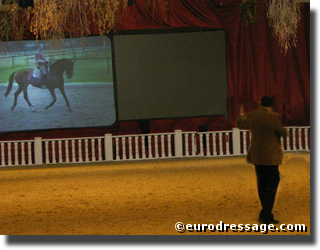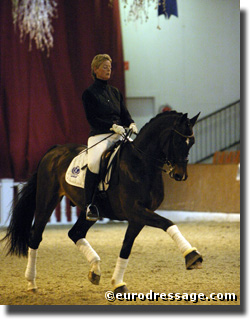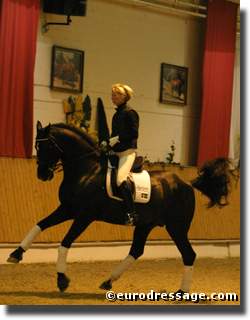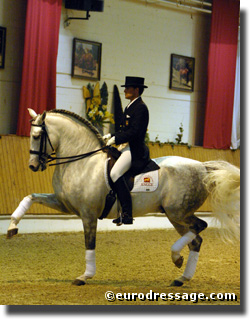|
2005
FEI/PSI Freestyle Forum
Stephan Krawczyk: Dressage to the Beat
 German
freestyle composer Stephan Krawczyk tried to explain
how the music's rhythm has
to be equal to the beat of the horse's movements, by
playing two video clips of Hubertus Schmidt riding
Wansuela Suerte. According
to Krawczyk, a good freestyle shows movements reflected
in the music. "You have to see what you hear," Krawczyk
said. German
freestyle composer Stephan Krawczyk tried to explain
how the music's rhythm has
to be equal to the beat of the horse's movements, by
playing two video clips of Hubertus Schmidt riding
Wansuela Suerte. According
to Krawczyk, a good freestyle shows movements reflected
in the music. "You have to see what you hear," Krawczyk
said.
He first showed a soundless video tape of Hubertus
Schmidt riding his kur to music at his home in Paderborn,
Germany. For Krawczyk, the composition of a freestyle
starts with the choreography. Schmidt had created one
to which Krawczyk added popular music to make the composition
modern and catchy. He chose lyrics by German pop
artist Hermann
Gronnemeier and pointed out how different
tunes from one genre of music gives more pizzazz to
each movement.
Krawczyk's
lecture
at the forum was a bit unstructured and it was hard
to understand the point he was trying to make when
he showed the silent movie of Schmidt without giving
educational comments. He made the most sense by stating
that
"it is more difficult to compete in the kur,
because the rider has to perform to the music and
not at
definite points in the ring. That is the art of
freestyle riding." To date, riding exactly
to the music is considered to be an artistic accomplishment
and a rider earns a higher score for it at the
artistic level. One wonders if it not also fits
the category
of
technical difficulty. How many riders are able
to really make their music match their performance.
Is it not mastery of technical riding skills to
perform exercises right on the beat of the music?!
 A
much more interesting discussion arose during Ann Kathrin
Linsenhoff's demonstration on her new
Grand Prix horse Sterntaler, an Oldenburg gelding by
Sion. Linsenhoff did not ride a kur, but showed some
Grand Prix movements. Her green Sterntaler showed great
potential in the piaffe and passage as well as in the
pirouettes. This was an incentive for Volker Moritz
to start a debate on the pirouette. The judges like
to see a
few
straight
strides before and after the pirouette. The Gabrielle
Grillo walk-pirouette transition is not longer preferred.
"it's too much in the direction of circus," Moritz
said. A
much more interesting discussion arose during Ann Kathrin
Linsenhoff's demonstration on her new
Grand Prix horse Sterntaler, an Oldenburg gelding by
Sion. Linsenhoff did not ride a kur, but showed some
Grand Prix movements. Her green Sterntaler showed great
potential in the piaffe and passage as well as in the
pirouettes. This was an incentive for Volker Moritz
to start a debate on the pirouette. The judges like
to see a
few
straight
strides before and after the pirouette. The Gabrielle
Grillo walk-pirouette transition is not longer preferred.
"it's too much in the direction of circus," Moritz
said.
David Hunt, president of the International Dressage
Trainers Club (IDTC), wondered why the few
straight strides are necessary when the horse
has the ability
to do a clear pirouette and taking into consideration
that the pirouette is a bending exercise. Moritz quickly
replied
that
"we follow the directives of the IDTC" which
state that the "in" and "out" of a pirouette has to
be on a straight
line.
The pirouette debate took a new turn when the experts
talked about a movement consisting of a
pirouette, followed by one or two straight strides
and then a
new pirouette.
Is
this
allowed? Yes. Judge Stephen Clarke said that this exercise
demonstrates a high degree of difficulty because of
the collection.
 Louise
Nathhorst and her 15-year old Guinness were the illustrators
for the flying changes debate. 9 flying
changes are an absolute minimum in the freestyle. 15
are desired, 20 is even better if you have a horse
that is very good at it. Heike Kemmer said
that she could not do too many single flying changes
because her horse Abano would get too hot. "Bonaparte
is now at an age that we are trying to do more. The
risk and difficulty of doing so many are higher if
you ride more in the freestyle" Kemmer said. According
to Withages, more flying changes is
a higher degree of difficulty, but all changes have
to be of good quality. Judge Dieter Schule said he
very much likes the transition from 2x to 1x tempi's
on
the circle. Louise
Nathhorst and her 15-year old Guinness were the illustrators
for the flying changes debate. 9 flying
changes are an absolute minimum in the freestyle. 15
are desired, 20 is even better if you have a horse
that is very good at it. Heike Kemmer said
that she could not do too many single flying changes
because her horse Abano would get too hot. "Bonaparte
is now at an age that we are trying to do more. The
risk and difficulty of doing so many are higher if
you ride more in the freestyle" Kemmer said. According
to Withages, more flying changes is
a higher degree of difficulty, but all changes have
to be of good quality. Judge Dieter Schule said he
very much likes the transition from 2x to 1x tempi's
on
the circle.
Spanish Olympic team rider Rafael Soto brought two
Spanish riders to the forum, Jose Antonio Garcia
Mena and Ignacio Rambla, to pepper the topic of piaffe
and passage, the trade mark of the Andalusian horse.
 Are
judges influenced by using the best movement of a horse
for the opening of the test; in case of the
Andalusians by riding the passage. "We are not
that easily impressed," was Withages' full-throated
declamation. Are
judges influenced by using the best movement of a horse
for the opening of the test; in case of the
Andalusians by riding the passage. "We are not
that easily impressed," was Withages' full-throated
declamation.
Spanish former young rider Jose Antonio Mena rode
three pirouettes on the centerline (D - X - G) with
his 12-year old Andalusian stallion Lance. Is this
a good exercise
for
a kur? Moritz said that if the technical execution
is well done, the mark will go up, but he found it
a quite boring choreography.
Text
and Images Copyrighted Astrid
Appels/Eurodressage.com - No Reproduction allowed
without explicit permission
Back
One Page / Index /
Next Page of the Report
|
